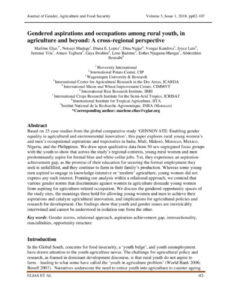Crop diversity contributes to yield stability and nutrition security and is valued for its potential use in breeding improved varieties and adaptation to future climates. Women across the globe contribute to biodiversity conservation, and, in the Central Andes region, the cradle of potato diversity, rural women play a vital role in the management of a wealth of native potato diversity. To examine how gender roles and traditions influence the agricultural and conservation practices of male and female custodians of native potato diversity, we undertook a qualitative study in eight farming communities high in the Andes, in the Pasco region of Peru. This article reviews agricultural and crop diversity management practices, farmer motivations for conserving potato diversity, the role that agrobiodiversity plays in family diets and economies, and support of in situ conservation by external actors. It examines how gender norms limit the potential of women to fully benefit from the crop and argues for more gender-responsive approaches that empower both women and men, enable women to overcome barriers, and contribute to a more inclusive, community-based management of agrobiodiversity that ensures its long-term conservation and contribution to community development and well-being.
Gender Roles and Native Potato Diversity Management in Highland Communities of Peru
Citation: Molina, C. A., Dudenhoefer, D., Polar, V., Scurrah, M., Ccanto, R. C., & Heider, B. (2022). Gender Roles and Native Potato Diversity Management in Highland Communities of Peru. Sustainability. ISSN 2071-1050. 14(6). 20 p.
2022-04-01
BIODIVERSITY FOR THE FUTURE, GENDER, POTATO AGRI-FOOD SYSTEMS, POTATOES, SEED SYSTEMS
SOUTH AMERICA
PERU
journal_article


